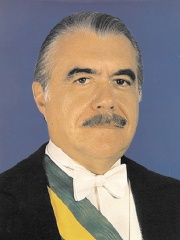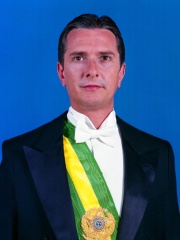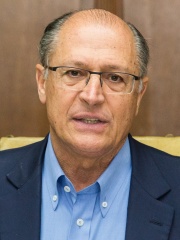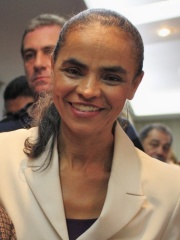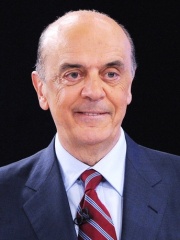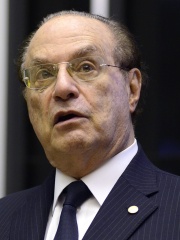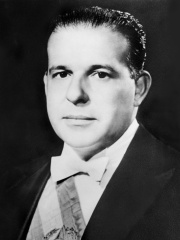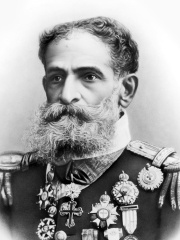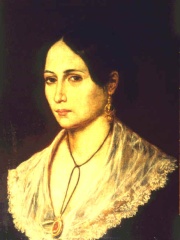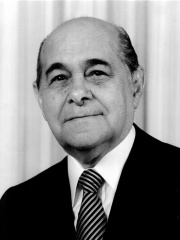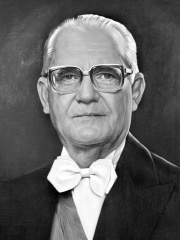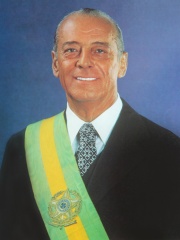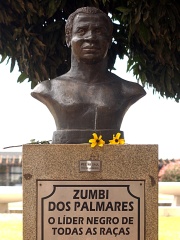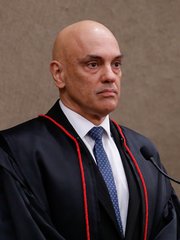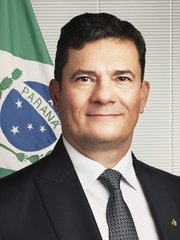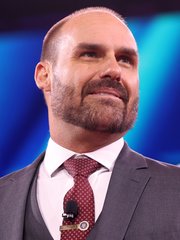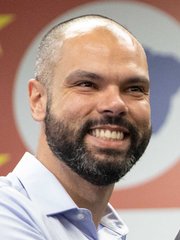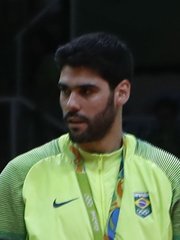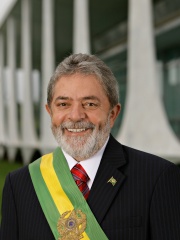
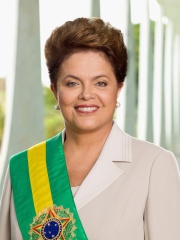
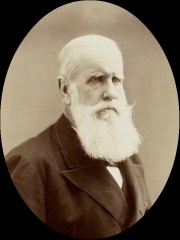
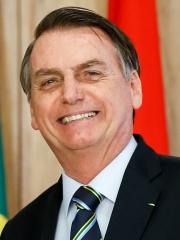
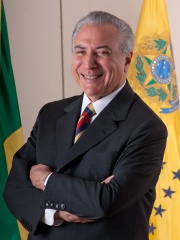
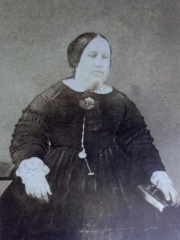
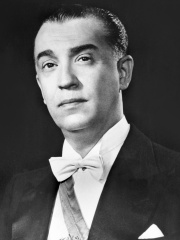
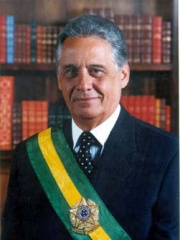
The Most Famous
POLITICIANS from Brazil
This page contains a list of the greatest Brazilian Politicians. The pantheon dataset contains 19,576 Politicians, 106 of which were born in Brazil. This makes Brazil the birth place of the 36th most number of Politicians behind Afghanistan, and Mexico.
Top 10
The following people are considered by Pantheon to be the top 10 most legendary Brazilian Politicians of all time. This list of famous Brazilian Politicians is sorted by HPI (Historical Popularity Index), a metric that aggregates information on a biography's online popularity. Visit the rankings page to view the entire list of Brazilian Politicians.

1. Luiz Inácio Lula da Silva (b. 1945)
With an HPI of 81.43, Luiz Inácio Lula da Silva is the most famous Brazilian Politician. His biography has been translated into 125 different languages on wikipedia.
Luiz Inácio Lula da Silva (born Luiz Inácio da Silva; 27 October 1945), known mononymously as Lula, is a Brazilian politician, trade unionist and former metalworker who has served as the 39th president of Brazil since 2023. A member of the Workers' Party, Lula was also the 35th president from 2003 to 2011. Born in Pernambuco, Lula quit school after second grade to work, and did not learn to read until he was ten years old. As a teenager, he worked as a metalworker and became a trade unionist. Between 1978 and 1980, he led the ABC workers' strikes during Brazil's military dictatorship, and in 1980, he helped start the Workers' Party during Brazil's redemocratization. Lula was one of the leaders of the 1984 Diretas Já movement, which demanded direct elections. In 1986, he was elected a federal deputy in the state of São Paulo. He ran for president in 1989, but lost in the second round. He also lost presidential elections in 1994 and 1998. He finally became president in 2002, in a runoff. In 2006, he was successfully re-elected in the second round. Described as left-wing, his first presidency coincided with South America's first pink tide. During his first two consecutive terms in office, he continued fiscal policies and promoted social welfare programs such as Bolsa Família that eventually led to GDP growth, reduction in external debt and inflation, and helping millions of Brazilians escape poverty. He also played a role in foreign policy, both on a regional level and as part of global trade and environment negotiations. During those terms, Lula was considered one of the most popular politicians in Brazil's history and left office with 80% approval rating. His first term was also marked by notable corruption scandals, including the Mensalão vote-buying scandal. After the 2010 Brazilian general election, he was succeeded by his former chief of staff, Dilma Rousseff, and remained active in politics and gave lectures. In July 2017, Lula was convicted on charges of money laundering and corruption in the Operation Car Wash context, after which he spent a total of 580 days in prison. He attempted to run in the 2018 Brazilian presidential election, but was disqualified under Brazil's Ficha Limpa law. He was convicted again in February 2019, and was released from prison the following November. His two convictions were nullified in 2021 by the Supreme Federal Court, in a ruling which also found serious biases in the first case against him, also annulling all other pending cases. Once legally allowed to make another run for the presidency, Lula did so in the 2022 election and ultimately defeated the incumbent Jair Bolsonaro in a runoff. Sworn in on 1 January 2023 at the age of 77, he became the oldest Brazilian president at time of inauguration, as well as the first to have defeated an incumbent president and to be elected to a third term.

2. Dilma Rousseff (b. 1947)
With an HPI of 77.08, Dilma Rousseff is the 2nd most famous Brazilian Politician. Her biography has been translated into 112 different languages.
Dilma Vana Rousseff (Brazilian Portuguese: [ˈdʒiwmɐ ˈvɐ̃nɐ ʁuˈsɛf(i)]; born 14 December 1947) is a Brazilian economist and politician who served as the 36th president of Brazil from 2011 until her impeachment and removal from office on 31 August 2016. She is the only woman to have held the Brazilian presidency. Since March 2023, she has been the Chair of the New Development Bank. She also served in the cabinet of Luiz Inácio Lula da Silva during his first presidency—first as Minister of Mines and Energy, from 2003 to 2005, then as Chief of Staff from 2005 to 2010. Rousseff was raised in an upper middle class household in Belo Horizonte. She became a socialist in her youth. After the 1964 coup d'état she joined left-wing and Marxist urban guerrilla groups that fought against the military dictatorship. Rousseff was captured, tortured, and jailed from 1970 to 1972. After her release, Rousseff rebuilt her life in Porto Alegre with her husband Carlos Araújo. They both helped to found the Democratic Labour Party (PDT) in Rio Grande do Sul, and participated in several of the party's electoral campaigns. She became the treasury secretary of Porto Alegre under Alceu Collares, and later Secretary of Energy of Rio Grande do Sul under both Collares and Olívio Dutra. In 2001, after an internal dispute in the Dutra cabinet, she left the PDT and joined the Workers' Party (PT). In 2002, Rousseff became an energy policy advisor to presidential candidate Luiz Inácio Lula da Silva, who on winning the election invited her to become his minister of energy. After chief of Staff José Dirceu resigned in 2005 in a political crisis triggered by the Mensalão corruption scandal, Rousseff became chief of staff and remained in that post until 31 March 2010, when she stepped down to run for president. She was elected in a run-off in 2010, beating Brazilian Social Democracy Party (PSDB) candidate José Serra. In 2014 she won a narrow second-round victory over Aécio Neves, also of PSDB, to serve her second term as president. Impeachment proceedings against Rousseff began in the Chamber of Deputies on 3 December 2015. On 12 May 2016, the Senate of Brazil suspended President Rousseff's powers and duties for up to six months or until the Senate decided whether to remove her from office or to acquit her. Vice President Michel Temer assumed her powers and duties as acting president of Brazil during her suspension. On 31 August 2016, the Senate voted 61–20 to convict, finding Rousseff guilty of breaking budgetary laws, and removed her from office. On 5 August 2018, the PT officially launched Rousseff's candidacy for a seat in the Federal Senate from the state of Minas Gerais. Rousseff finished fourth in the final vote and was defeated for her Senate run.

3. Pedro II of Brazil (1825 - 1891)
With an HPI of 76.55, Pedro II of Brazil is the 3rd most famous Brazilian Politician. His biography has been translated into 71 different languages.
Dom Pedro II (Pedro de Alcântara João Carlos Leopoldo Salvador Bibiano Francisco Xavier de Paula Leocádio Miguel Gabriel Rafael Gonzaga; 2 December 1825 – 5 December 1891), nicknamed the Magnanimous (Portuguese: O Magnânimo), was the second and last monarch of the Empire of Brazil, reigning from 1831 until his overthrow in 1889. Pedro II was born in Rio de Janeiro, the seventh child of Emperor Dom Pedro I of Brazil and Empress Dona Maria Leopoldina. His father's abrupt abdication and departure to Europe in 1831 left the five-year-old as emperor and led to a lonely childhood and adolescence, obliged to spend his time studying in preparation for rule. His experiences with court intrigues and political disputes during this period greatly affected his later character; he grew into a man with a strong sense of duty and devotion toward his country and his people, yet increasingly resentful of his role as monarch. Pedro II inherited an empire on the verge of disintegration, but he turned Brazil into an emerging power in the international arena. The nation grew to be distinguished from its Hispanic neighbors on account of its political stability, freedom of speech, respect for civil rights, vibrant economic growth, and form of government—a functional representative parliamentary monarchy. Brazil was also victorious in the Platine War, the Uruguayan War, and the Paraguayan War, as well as prevailing in several other international disputes and domestic tensions. Pedro II pushed through the abolition of slavery despite opposition from powerful political and economic interests. The Emperor established a reputation as a vigorous sponsor of learning, culture, and the sciences. The Emperor was overthrown in a sudden coup d'état that had little popular support outside a clique of military leaders who desired a form of republic headed by a dictator. Pedro II had become weary of emperorship and despaired over the monarchy's future prospects, despite its overwhelming popular support. He did not allow his ouster to be opposed and did not support any attempt to restore the monarchy. He spent the last two years of his life in exile in Europe, living alone on little money. The reign of Pedro II ended while he was highly regarded by the people and at the pinnacle of his popularity, and some of his accomplishments were reversed as Brazil slipped into a long period of weak governments, dictatorships, and constitutional and economic crises. The men who had exiled him soon began to see in him a model for the Brazilian Republic. A few decades after his death, his reputation was restored and his remains were returned to Brazil with celebrations nationwide. Historians have regarded the Emperor positively and several have ranked him as the greatest Brazilian.

4. Jair Bolsonaro (b. 1955)
With an HPI of 75.65, Jair Bolsonaro is the 4th most famous Brazilian Politician. His biography has been translated into 122 different languages.
Jair Messias Bolsonaro (Brazilian Portuguese: [ʒaˈiʁ meˈsi.ɐz bowsoˈnaɾu] ; born 21 March 1955) is a Brazilian politician and former military officer who served as the 38th president of Brazil from 2019 to 2023. He previously served as a member of the Chamber of Deputies from 1991 to 2019. Born in Glicério, São Paulo, Bolsonaro began serving in the Brazilian Army in 1973 and graduated from the Military Academy of Agulhas Negras in 1977. He attracted publicity in 1986 after he wrote an article for Veja magazine criticizing the low wages of military officers, after which he was arrested and detained for fifteen days. He left the army and was elected to the Municipal Chamber of Rio de Janeiro two years later. In 1990 he was first elected to the Chamber of Deputies as a representative for the state of Rio de Janeiro. During his 27-year tenure as a congressman he became known for his national conservatism. Bolsonaro entered the 2018 presidential election, during which he began advocating economically liberal and pro-market policies. After surviving an assassination attempt on 6 September, he led in the 7 October first-round results and defeated Fernando Haddad in the 28 October runoff. Bolsonaro focused on domestic affairs in his first months as president, dealing primarily with the fallout of the 2014 Brazilian economic crisis. The economy recovered slowly, while crime rates fell sharply during the first year. He rolled back protections for Indigenous groups in the Amazon rainforest and facilitated its deforestation. Bolsonaro's response to the COVID-19 pandemic in Brazil was criticized across the political spectrum after he sought to downplay the pandemic and its effects, opposed quarantine measures, and dismissed two health ministers, while the death toll increased rapidly. A polarizing politician, Bolsonaro has drawn both praise and criticism in Brazil for his views and comments, which have been described as far-right and populist. He is a vocal opponent of same-sex marriage, abortion, affirmative action, drug liberalization, and secularism. In foreign policy he has advocated closer relations with Israel and with the United States; later in his presidency he also made efforts to improve relations with the BRICS countries. In the 2022 general election Bolsonaro lost to Luiz Inácio Lula da Silva. On 8 January 2023 a mob of Bolsonaro's supporters stormed federal government buildings, calling for a coup d'état. On 30 June the Superior Electoral Court blocked Bolsonaro from seeking office until 2030 for attempting to undermine the validity of the election through his unfounded claims of voter fraud, and for abusing his power by using government communication channels to both promote his campaign and to allege fraud. Testimony from military officials showed that Bolsonaro had planned a self-coup with the military to keep himself in power. In November 2024 he was indicted by the Federal Police of Brazil of multiple crimes related to the planned coup. He was charged in February 2025, and the Supreme Court ruled he must stand trial. On 4 August 2025 he was placed under house arrest for using a mobile phone and accessing social media via his son Eduardo, violating pre-trial rules. His trial began on 2 September; on 11 September he was found guilty by the Supreme Federal Court and sentenced to 27 years and 3 months in prison. On November 22, 2025, Bolsonaro was arrested by the federal police after trying to remove his electronic ankle monitor. Two days later, the Supreme Federal Court unanimously voted to keep Bolsonaro in police custody.
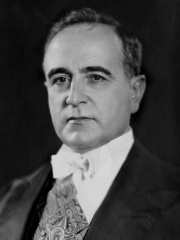
5. Getúlio Vargas (1882 - 1954)
With an HPI of 74.28, Getúlio Vargas is the 5th most famous Brazilian Politician. Her biography has been translated into 74 different languages.
Getúlio Dornelles Vargas (19 April 1882 – 24 August 1954) was a Brazilian lawyer and politician who served as the 14th and 17th president of Brazil, from 1930 to 1945 and from 1951 until his suicide in 1954. Due to his long and controversial tenure as Brazil's provisional, constitutional, dictatorial and democratic leader, he is considered by historians as the most influential Brazilian politician of the 20th century. Born on 19 April 1882 in São Borja, Rio Grande do Sul, to a powerful local family, Vargas had a short stint in the Brazilian Army before entering law school. He began his political career as district attorney, soon becoming a state deputy prior to a brief departure from politics. After returning to the state Legislative Assembly, Vargas led troops during Rio Grande do Sul's 1923 civil war. He entered national politics as a member of the Chamber of Deputies. Afterward, Vargas served as Minister of Finance under president Washington Luís before resigning to head Rio Grande do Sul as state president, during which he had an active tenure and introduced many policies. In 1930, after losing the presidential election, Vargas rose to power under a provisional presidency following an armed revolution, remaining until 1934 when he was elected president under a new constitution. Three years later he seized powers under the pretext of a potential communist insurrection, beginning the eight-year long Estado Novo dictatorship. In 1942, he led Brazil into World War II on the side of the Allies after being sandwiched between Nazi Germany and the United States. Though there was notable opposition to his government, the major revolts – the 1932 Constitutionalist Revolution in his provisional government, the Communist uprising of 1935 in his constitutional presidency, and the Brazilian Integralist Action's putsch in his dictatorship – were all successfully suppressed; the methods Vargas used in quelling his opposition ranged from light peace terms to jailing political opponents. Ousted in 1945 after fifteen years in power, Vargas returned to the presidency democratically after winning the 1950 Brazilian general election. However, a growing political crisis led to his suicide in 1954, prematurely ending his second presidency.

6. Michel Temer (b. 1940)
With an HPI of 73.35, Michel Temer is the 6th most famous Brazilian Politician. His biography has been translated into 76 different languages.
Michel Miguel Elias Temer Lulia (Brazilian Portuguese: [miˈʃɛw miˈɡɛw eˈli.ɐs ˈtemeʁ luˈli.ɐ]; born 23 September 1940) is a Brazilian politician, lawyer, erotic poet and writer who served as the 37th president of Brazil from 31 August 2016 to 1 January 2019. He took office after the impeachment and removal from office of his predecessor Dilma Rousseff. He had been the 24th vice president since 2011 and acting president since 12 May 2016, when Rousseff's powers and duties were suspended pending an impeachment trial. The Senate's 61–20 vote on 31 August 2016 to remove Rousseff from office meant that Temer succeeded her and served out the remainder of her second term. In his first speech in office, Temer called for a government of "national salvation" and asked for the trust of the Brazilian people. He also signaled his intention to overhaul the pension system and labor laws, and to curb public spending. A 2017 poll showed that Temer's administration had 7% popular approval, with 76% of respondents in favor of his resignation. Despite widespread protests, Temer refused to step down. He did not stand for reelection as president in the 2018 Brazilian general election and was succeeded by Jair Bolsonaro.

7. Maria II of Portugal (1819 - 1853)
With an HPI of 73.31, Maria II of Portugal is the 7th most famous Brazilian Politician. Her biography has been translated into 49 different languages.
Dona Maria II (Maria da Glória Joana Carlota Leopoldina da Cruz Francisca Xavier de Paula Isidora Micaela Gabriela Rafaela Gonzaga de Habsburgo-Lorena e Bragança; 4 April 1819 – 15 November 1853) also known as "the Educator" (Portuguese: "a Educadora") or as "the Good Mother" (Portuguese: "a Boa Mãe"), was Queen of Portugal from 1826 to 1828, and again from 1834 to 1853. Her supporters considered her to be the rightful queen also during the period between her two reigns. Maria was born in Rio de Janeiro during the reign of her paternal grandfather, King Dom João VI. She was the first child of the Duke and Duchess of Braganza, who later became Emperor Dom Pedro I and Empress Dona Maria Leopoldina of Brazil. In 1826, her father became king of Portugal but quickly abdicated in favour of the seven-year-old Maria. Both Pedro and Maria remained in Brazil, and her aunt Dona Isabel Maria initially served as regent for them in Portugal. Later Emperor Pedro's brother Miguel replaced Isabel Maria as regent and was to marry Maria when she came of age. However, a few months after Miguel's arrival in Portugal in early 1828 he deposed the absent Maria and declared himself king, thus beginning the Liberal Wars over royal succession. Maria remained outside Portugal throughout her first reign, finally arriving in Gibraltar just in time to learn of her deposition. She proceeded to England and then returned to Brazil. In 1831 her father (having abdicated the Brazilian throne) returned to Europe with his daughter and led a military expedition in support of Maria's claim while she pursued her education in France. She finally set foot in Portugal for the first time in 1833 after Lisbon was occupied by forces supporting her. In 1834, Miguel was forced to abdicate and Maria was restored as undisputed queen. She remained a member of the Brazilian imperial family until 1835 when she was excluded from the Brazilian line of succession by law. Maria's second reign was marked by continued political turmoil. In January 1835, she married Auguste, Duke of Leuchtenberg, who died two months after their marriage. In April 1836, Maria remarried to Prince Ferdinand of Saxe-Coburg and Gotha-Kohary. Maria's second husband was proclaimed King Dom Fernando II a year later in accordance with Portuguese law following the birth of their first child, Pedro. Maria faced a series of difficult pregnancies and ultimately died in childbirth in 1853, at the age of 34. She was succeeded by her eldest son, Dom Pedro V.

8. Juscelino Kubitschek (1902 - 1976)
With an HPI of 70.43, Juscelino Kubitschek is the 8th most famous Brazilian Politician. His biography has been translated into 62 different languages.
Juscelino Kubitschek de Oliveira (Brazilian Portuguese pronunciation: [ʒuseˈlinu kubiˈʃɛk(i) dʒi oliˈve(j)ɾɐ]; 12 September 1902 – 22 August 1976), also known by his initials JK, was a Brazilian politician who served as the 21st president of Brazil from 1956 to 1961. Kubitschek's government plan, dubbed "50 years in 5", was centered on economic and social development. During his term the country experienced a period of notable economic growth and relative political stability. However, there was also a significant increase in external debt, inflation, income concentration and wage erosion. At the time, there was no re-election and, on 31 January 1961, he was succeeded by Jânio Quadros, supported by the UDN. Kubitschek is best known for the construction of Brazil's new capital, Brasília, which was inaugurated on 21 April 1960, replacing Rio de Janeiro. Kubitschek was born in Diamantina, Minas Gerais, in 1902. His father, João César de Oliveira, died when he was only two years old. JK completed the humanities course at the Diamantina Seminary and moved to Belo Horizonte in 1920. In 1927, he graduated in medicine from the Federal University of Minas Gerais (UFMG), and in 1930 he specialized in urology in Paris. In December 1931, he married Sarah Lemos, with whom he had a daughter, Márcia, in 1943. The couple also adopted Maria Estela in 1947. In 1931, Kubitschek joined the Public Force of Minas Gerais as a doctor. During this period, he served on the Constitutionalist Revolution and became friend with politician Benedito Valadares who, upon being appointed federal intervenor in 1933, appointed Kubitschek as his chief of staff. In 1934, Kubitschek was elected federal deputy, but his term was revoked during the Estado Novo coup. With the loss of his term, Kubitschek returned to medicine. In 1940, he was appointed mayor of Belo Horizonte by Valadares, remaining in this position until October 1945. At the end of the same year he was elected constituent deputy for the Social Democratic Party (PSD). In 1950, he defeated Bias Fortes in the PSD caucuses to choose the party's candidate for that year's gubernatorial election in Minas Gerais. In the election, he defeated his brother-in-law Gabriel Passos and was sworn in as governor on 31 January 1951. As governor, he created the Companhia Energética de Minas Gerais, and also prioritized road building and industrialization. In October 1954, Kubitschek launched his candidacy for the 1955 presidential election, which was made official in February 1955. He presented a developmentalist speech and used "50 years in 5" as his campaign slogan. In an alliance formed by six parties, his running mate was João Goulart. On 3 October, he was elected president of Brazil with 35.6% of the votes. The opposition tried to annul the election on the grounds that Kubitschek had not obtained an absolute majority of votes. However, general Henrique Teixeira Lott triggered a military movement to ensure Kubitschek's inauguration. As president, Kubitschek was responsible for the construction of a new federal capital, Brasília, thus carrying out an old project to promote the development of Brazil's interior and the country's integration. In 1961, Kubitschek was elected senator for Goiás and tried to make his candidacy for the 1965 presidential election viable. However, with the 1964 military coup, Kubitschek was accused by the military of corruption and being supported by the communists. As a result, his term was revoked and his political rights were suspended. From then on, Kubitschek began touring cities in the United States and Europe, in voluntary exile. In March 1967, he returned to Brazil and joined Carlos Lacerda and Goulart in organizing the Frente Ampla, in opposition to the military dictatorship. The Frente Ampla was extinguished by the military a year later, and Kubitschek went to prison for a short period. He intended to return to political life ten years after the suspension of his political rights. In October 1975, Kubitschek unsuccessfully ran for a seat at the Brazilian Academy of Letters. He occupied chair number 34 at the Minas Gerais Academy of Letters. Kubitschek died in a car accident on 22 August 1976. According to the forensic examination and official report at the time, the accident occurred as a result of a normal traffic fatality. The conclusion was contested by his family, who asked for the remains to be exhumed twenty years later, suspecting that Kubitschek had been the victim of a murder. The results of the examination confirmed the previous reports.

9. Fernando Henrique Cardoso (b. 1931)
With an HPI of 69.65, Fernando Henrique Cardoso is the 9th most famous Brazilian Politician. His biography has been translated into 56 different languages.
Fernando Henrique Cardoso (Brazilian Portuguese: [feʁˈnɐ̃du ẽˈʁiki kaʁˈdozu] ; born 18 June 1931), also known by his initials FHC (Brazilian Portuguese: [ˌɛfjaɡaˈse] ), is a Brazilian sociologist, professor, and politician who served as the 34th president of Brazil from 1 January 1995 to 1 January 2003. He was the first Brazilian president to be reelected for a subsequent term. An accomplished scholar of dependency theory noted for his research on slavery and political theory, Cardoso has earned many honors including the Prince of Asturias Award for International Cooperation (2000) and the Kluge Prize from the US Library of Congress (2012). Cardoso was inaugurated as president on January 1, 1995. He continued the economic reforms that had been initiated by the previous administration, inflation rates remained low, several state-owned companies were privatized, and market liberalization increased the country's visibility in the international market. The government succeeded in passing economic and administrative laws, including one that allowed for the reelection of executive officeholders. In 1998, he won the presidential election in the first round, becoming the first president to be reelected at the time. During his second term, international crises, a significant devaluation of the Real, the energy crisis, and other events led to a significant drop in his popularity. Currently, he heads the Fernando Henrique Cardoso Foundation, which he founded in 2004, and serves on various advisory boards for different organizations abroad, such as the Clinton Global Initiative, Brown University, and the United Nations Foundation. He is also a member of The Elders, the Brazilian Academy of Letters, and the honorary president of the PSDB (Brazilian Social Democracy Party). Cardoso was also the 10th president of the International Sociological Association (1982–1986).
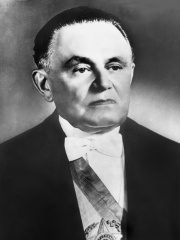
10. Humberto de Alencar Castelo Branco (1897 - 1967)
With an HPI of 69.35, Humberto de Alencar Castelo Branco is the 10th most famous Brazilian Politician. His biography has been translated into 47 different languages.
Humberto de Alencar Castelo Branco (20 September 1897 – 18 July 1967) was a Brazilian military officer and politician who served as the 26th president of Brazil, the first leader of the Brazilian military dictatorship following the 1964 coup d'état. He was a member of a more liberal "legalist" faction within the regime, as opposed to his more authoritarian successors. His administration oversaw the consolidation of the military regime. One of his first acts was the enactment of Institutional Act No. 2, which abolished the multi-party system in the country and granted the President of the Republic the power to revoke the mandates of congressmen and call for indirect elections. In Brazilian foreign policy, he began to seek economic, political, and military support from the United States. He was the son of General Cândido Borges Castelo Branco, the sixth grandson of the eleventh Lord of Pombeiro and his wife, the ninth Lady of Belas, and his wife Antonieta de Alencar Gurgel, a member of the family of the writer José de Alencar.
People
Pantheon has 106 people classified as Brazilian politicians born between 1571 and 2000. Of these 106, 43 (40.57%) of them are still alive today. The most famous living Brazilian politicians include Luiz Inácio Lula da Silva, Dilma Rousseff, and Jair Bolsonaro. The most famous deceased Brazilian politicians include Pedro II of Brazil, Getúlio Vargas, and Maria II of Portugal. As of April 2024, 16 new Brazilian politicians have been added to Pantheon including Alexandre de Moraes, Sergio Moro, and Eduardo Bolsonaro.
Living Brazilian Politicians
Go to all RankingsLuiz Inácio Lula da Silva
1945 - Present
HPI: 81.43
Dilma Rousseff
1947 - Present
HPI: 77.08
Jair Bolsonaro
1955 - Present
HPI: 75.65
Michel Temer
1940 - Present
HPI: 73.35
Fernando Henrique Cardoso
1931 - Present
HPI: 69.65
José Sarney
1930 - Present
HPI: 66.74
Fernando Collor de Mello
1949 - Present
HPI: 65.63
Geraldo Alckmin
1952 - Present
HPI: 62.30
Raoni Metuktire
1940 - Present
HPI: 61.19
Marina Silva
1958 - Present
HPI: 57.72
José Serra
1942 - Present
HPI: 56.81
Paulo Maluf
1931 - Present
HPI: 56.28
Deceased Brazilian Politicians
Go to all RankingsPedro II of Brazil
1825 - 1891
HPI: 76.55
Getúlio Vargas
1882 - 1954
HPI: 74.28
Maria II of Portugal
1819 - 1853
HPI: 73.31
Juscelino Kubitschek
1902 - 1976
HPI: 70.43
Humberto de Alencar Castelo Branco
1897 - 1967
HPI: 69.35
João Goulart
1918 - 1976
HPI: 69.32
Deodoro da Fonseca
1827 - 1892
HPI: 68.92
Anita Garibaldi
1821 - 1849
HPI: 68.91
Tancredo Neves
1910 - 1985
HPI: 67.93
Ernesto Geisel
1907 - 1996
HPI: 67.71
João Figueiredo
1918 - 1999
HPI: 67.62
Zumbi
1655 - 1695
HPI: 67.12
Newly Added Brazilian Politicians (2025)
Go to all RankingsAlexandre de Moraes
1968 - Present
HPI: 53.12
Sergio Moro
1972 - Present
HPI: 47.27
Eduardo Bolsonaro
1984 - Present
HPI: 45.51
Marcos Marcello Trad
1964 - Present
HPI: 41.33
Manuela d'Ávila
1981 - Present
HPI: 40.17
Bruno Covas
1980 - 2021
HPI: 39.24
Evandro Guerra
1981 - Present
HPI: 39.24
Erika Hilton
1992 - Present
HPI: 39.23
Paula Pequeno
1982 - Present
HPI: 38.89
Ana Beatriz
1985 - Present
HPI: 38.08
Érika Miranda
1987 - Present
HPI: 37.38
Bárbara Seixas
1987 - Present
HPI: 37.34
Overlapping Lives
Which Politicians were alive at the same time? This visualization shows the lifespans of the 25 most globally memorable Politicians since 1700.

